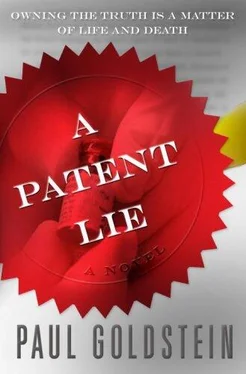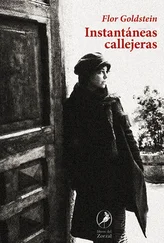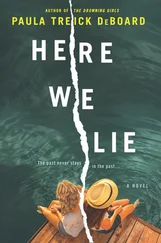Paul Goldstein - A Patent Lie
Здесь есть возможность читать онлайн «Paul Goldstein - A Patent Lie» весь текст электронной книги совершенно бесплатно (целиком полную версию без сокращений). В некоторых случаях можно слушать аудио, скачать через торрент в формате fb2 и присутствует краткое содержание. Жанр: Криминальный детектив, на английском языке. Описание произведения, (предисловие) а так же отзывы посетителей доступны на портале библиотеки ЛибКат.
- Название:A Patent Lie
- Автор:
- Жанр:
- Год:неизвестен
- ISBN:нет данных
- Рейтинг книги:3 / 5. Голосов: 1
-
Избранное:Добавить в избранное
- Отзывы:
-
Ваша оценка:
- 60
- 1
- 2
- 3
- 4
- 5
A Patent Lie: краткое содержание, описание и аннотация
Предлагаем к чтению аннотацию, описание, краткое содержание или предисловие (зависит от того, что написал сам автор книги «A Patent Lie»). Если вы не нашли необходимую информацию о книге — напишите в комментариях, мы постараемся отыскать её.
A Patent Lie — читать онлайн бесплатно полную книгу (весь текст) целиком
Ниже представлен текст книги, разбитый по страницам. Система сохранения места последней прочитанной страницы, позволяет с удобством читать онлайн бесплатно книгу «A Patent Lie», без необходимости каждый раз заново искать на чём Вы остановились. Поставьте закладку, и сможете в любой момент перейти на страницу, на которой закончили чтение.
Интервал:
Закладка:
Leonard said, “What kind of question is that?”
Seeley laughed. “Why would I have to choose?”
“It's always a choice,” Renata said.
Seeley said, “I never thought about it. What about you?”
Renata touched the empty champagne flute to her lips. “You really should think about it. You'd be amazed how much the answer will tell you about yourself.”
“Right now,” Leonard said, “I just want Mike thinking about one thing-our case. He told me there's no way we can lose.”
“Then you're in good hands,” Renata said.
“Drink up, Mike. Can I give you a tour of the house?”
Seeley was aware that Renata was watching him. “Thanks, I'm fine here.”
Leonard said, “How do you like it? The house.”
Seeley looked around. “It's a lot of glass.”
“You mean, too much for earthquake country.”
Seeley hadn't meant anything.
“The structure is cantilevered,” Leonard said. “It was designed by a student of Frank Lloyd Wright. Do you want to hear a story? Wright designed a house a couple of miles from here on the Stanford campus, and when the owners discovered it was on top of the San Andreas fault they sent him a frantic letter. Do you know what Wright sent back? A telegram: ‘I built the Imperial Hotel in Tokyo’! This house is the same. The earth would have to split to its core before you even heard a rattle.”
Seeley knew nothing about earthquakes, and didn't know if this was the usual California bravado or just his brother's.
Leonard lifted the bottle and Seeley thought he was going to fill Renata's glass, but instead, he started back to the kitchen.
“Make the steaks rare,” Renata called out. “Not dead.” She turned back to Seeley and, so Leonard could hear, said, “My husband used to be a fine doctor, but he doesn't know the first thing about broiling meat.”
She placed her empty glass on the coffee table next to Seeley's still-full one, asking his permission with a look before lifting his glass.
“To Henry James,” she said.
It occurred to Seeley that Renata's drinks had started much earlier. The scariest drunken times for him were when he was aware that, behind his rigid mask of sanity, he was entirely out of control, and he wondered now if that was how it was for Renata. Stone-faced drunk, he had once called a sitting justice of the New York Supreme Court a toad. A pompous toad. Other lawyers had called the judge worse, but not to his face, and not in his chambers. The incident had brought him to the brink of being disbarred.
“Your mother says you've had an amazing career, that you win all your cases.”
Seeley wondered how much Leonard told her about their life growing up.
“I didn't know she was keeping track.”
“She subscribes to a couple of legal newspapers just so she can see how you're doing.”
Seeley remembered Leonard telling it differently in Buffalo.
“Whenever there's something about you, she clips it out for Leonard. She's tremendously proud of you, but I don't think she knows how to tell you.” She sipped at Seeley's champagne. “She told me about your wanderlust, how you left home when you were fifteen.”
In the fireplace, a log dropped and sent up a shower of sparks.
“She says you're like mercury, that you're impossible to grab hold of. First you go to New York, then you go back to Buffalo. She didn't say it, but I got the impression she thinks you waited until she left Buffalo before you moved back.”
“I moved to New York because I wanted more challenging cases. I went back to Buffalo because I wasn't getting the kind of cases I wanted.”
Renata emptied Seeley's glass. “Did Leonard tell you she's in Mexico with her church group? Somebody dropped out at the last minute and she took her place. I think she was afraid you wouldn't want to see her.”
This was the kind of conversation women liked, and Seeley lacked the words, the grammar, even the tone of voice it required. “I only came here to try a case.” He took the empty glass from her and returned it to the end table next to him. “Did you know Robert Pearsall?”
She followed his lead as closely as if they were dancing. “Do you mean, do I think he killed himself?”
Now that Renata had turned on the hassock to be closer to him, Seeley found it unsettling, the way she looked directly in his eyes as she talked.
“When I was an intern, I tried out a psychiatry rotation for three months before I decided to be a real doctor. There's something about suicidal patients that you don't see in the others, even the most depressed ones. There's an emptiness in the back of their eyes that just goes on and on; there's nothing there.”
“And Pearsall?”
“I don't know. I saw him at one or two parties up in the city and a couple down here. His wife's on the board of a private school we support. He always seemed agreeable, but you could see he had a deeper, serious side.” Renata hesitated. “No,” she decided, “there was always a light in his eyes. He didn't have that hopeless look.”
Leonard called out that dinner was ready, and Seeley followed Renata into another glassed-in room. Three chairs were at the end of a long table, and place mats, silver, and glasses were set in front of them along with a green salad and an open bottle of Bordeaux. The steak, sliced and heaped on a platter, was rare.
Renata said, “We were just talking about Bob Pearsall.”
Leonard filled no more than a quarter of Renata's glass, and Seeley waved him away from his.
“You only had a glass of champagne.”
“I have an early meeting tomorrow.” Leonard didn't need to know that the meeting was with Pearsall's widow, to search through the lawyer's belongings for a missing trial notebook, anymore than he needed to know that it was Renata, not he, who had emptied the glass. It was a reflex. He did the same when they were boys, protecting Leonard from anything that he thought might upset him.
“One of the mysteries of the human soul,” Leonard said. “You look at a guy like Pearsall, he seems fine to you, but you never know what's going on inside.”
Seeley said, “I was thinking about what you said, that the train was between stations when it hit him.”
Renata sipped at her wine. “Why should that be important?”
Leonard said, “You wouldn't believe my brother's sense of humor. When I went to see him in Buffalo, he asked me if I pushed him. Pearsall.”
“Mike!” Renata laughed.
It was the first time she had spoken his name, and the sudden cry felt as intimate as if she had slipped her hand into his.
Leonard speared a slice of steak from the platter. “Do you remember Billy Elrod, Mike?” He turned back to Renata. “Elrod was a little hoodlum when we were at St. Boniface, the kind of kid who picked wings off flies. Once, for a week, he went around the playground with what looked like one of those narrow jars olives come in, but filled with a clear liquid. Billy swore it was nitroglycerin, and that if anyone told the teachers, he would drop it and blow the place up. We all knew he was lying, but still with Billy you couldn't be sure. Finally, my brother here-how old were you, Mike, ten? eleven? — goes up to him and says, ‘Hey Billy, look up in the sky, there's a blimp’”-Leonard pantomimed, pointing to the ceiling-“and when Billy looks up, Mike pokes a finger into his stomach”-again, Leonard playacted the move-“so that he drops the bottle and it smashes on the ground. Of course it was just water. That's my brother's sense of humor.”
After that, the conversation drifted to Renata's childhood in Schenectady, the challenges women faced as surgeons, stories about her work as one of the Stanford football team's on-field physicians, and the constant temptation to go into research.
Читать дальшеИнтервал:
Закладка:
Похожие книги на «A Patent Lie»
Представляем Вашему вниманию похожие книги на «A Patent Lie» списком для выбора. Мы отобрали схожую по названию и смыслу литературу в надежде предоставить читателям больше вариантов отыскать новые, интересные, ещё непрочитанные произведения.
Обсуждение, отзывы о книге «A Patent Lie» и просто собственные мнения читателей. Оставьте ваши комментарии, напишите, что Вы думаете о произведении, его смысле или главных героях. Укажите что конкретно понравилось, а что нет, и почему Вы так считаете.












